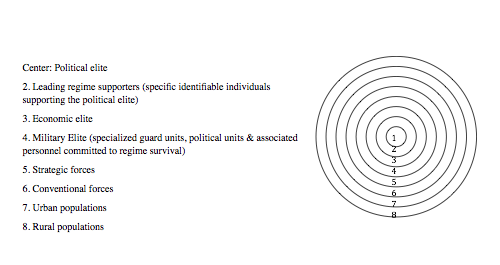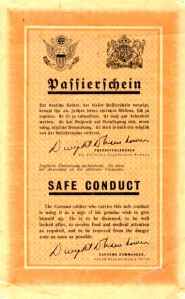The measure of a person’s or a people’s character is not what they do when everything is comfortable. It’s what they do in an extremely trying and difficult situation. If we want to claim that these are our ideals and our values, then we need to hold to them no matter how dark the situation.
– Captain Ian Fishback, United States Army 82d Airborne Division
 hile Humanist opposition to war is laudable, Humanists often surrender the intellectual field after battle commences. Calls for “Peace Now!” provide neither policymakers nor warfighters Humanist concepts on how to conduct ethical operations or to achieve military goals. Humanists must become a relevant voice during conflict. This article discusses war within a Humanist ethical perspective.
hile Humanist opposition to war is laudable, Humanists often surrender the intellectual field after battle commences. Calls for “Peace Now!” provide neither policymakers nor warfighters Humanist concepts on how to conduct ethical operations or to achieve military goals. Humanists must become a relevant voice during conflict. This article discusses war within a Humanist ethical perspective.
Humanist Ethics
Modern Humanism is not a set doctrine but rather a philosophical viewpoint. Bob Berson, leader of the Ethical Society of Northern Westchester in the United States explained, “Humanism affirms that we have both the freedom and responsibility to make a more humane world, to be actively engaged in the endeavors that improve human existence.” Humanists select a course of action by attempting to anticipate how it might affect other individuals and the greater community. Individuals should be viewed as each having inherent worth and dignity, according to the American Ethical Union. Berson also emphasized that Humanism is “deeply committed to freedom of thought and conscience; free inquiry; the use of reason, dialogue, and discussion; democracy; and the scientific method. Humanism abhors bigotry, recognizing that all people are one species; part of one human family, and Humanism strongly advocates the democratic process and the concept of human rights.” Similar views are found in the various Humanist declarations and manifestos.
These concepts suggest that Humanists have specific ethical approaches to war. Humanists ethics applied to warfare would typically reject war as an option short of self-defense and emphasize dialogue even during combat operations. It would see warfare as an effort against specific individuals rather than an anonymous enemy, and would identify and focus efforts on people who promoted the conflict. Simultaneously, individuals having no say in the conflict would be unharmed and protected. In all cases possible, Humanists would seek to remove opponents through dialogue and negotiation. Actions that would inflame nationalist or sectarian attitudes would be rejected, while democratic ideas and human rights would be promoted.
War Defined
War is physical violence by one nation-state against another to achieve a political goal or set of goals which may evolve during the course of the conflict. Wars may also involve a nation-state against a non-state adversary, but war’s general definition mandates that both belligerent have organized units to defend and/or attack. Violence by nation-states against defenseless or disorganized groups is not war, and may under specific circumstances be a crime under international law.
The Costs of War
Humanists justifiably oppose war in nearly all cases. The costs of war are typically high. Wars divert resources from productive economic action to useless production. Equipment constructed for the battlefield typically has no peacetime use and is often disposed of at considerable loss. Industries designed to produce war goods often find themselves incapable of building competitive peacetime products. Surviving war veterans often return injured or psychologically maimed.
Extremists often gain greater control in countries at war as moderates withdraw or are excluded from the decision making process. Extremism poses an even greater danger post-war. Radical groups often have war veterans as core members. Arab youths who joined the jihad against the Soviets in Afghanistan returned home with skills valuable to extremist Islamic factions. Even U.S. extremist groups are bolstered by disaffected veterans with combat skills.
Wars rarely proceed as planned, and even the victor can find the cost of war high. World War I witnessed nearly an entire generation disappear along with an international structure. Short of victory, extricating oneself from a war is rarely easy. U.S. withdrawals from conflicts in Vietnam and Iraq took years and thousands of lives. Occupations are almost never successful and often lead to hatred, xenophobia and resentment that lasts for generations.
There are few justifications for war beyond self-defense from a Humanist perspective. Even in such a case, Humanists must carefully gauge a proportional response to aggression and avoid vengeful retaliation. Humanist empathy compels many to advocate humanitarian intervention in foreign conflicts to protect threatened minorities. But while intervention is sometimes necessary, cultures are complex, and intervention by outsiders frequently makes conditions worse. Humanists should take care advocating intervention on humanitarian grounds but must, as an ethical necessity, strengthen emerging democratic institutions, build international coalitions and organizations that can respond to crises, and aide refugee and humanitarian relief efforts.
War and International Law
Modern Warfare is constricted by international conventions and traditions referred to as the Laws of War. Most developed countries understand the laws of war and have signed the relevant treaties. However, abuses still occur for a variety of reasons — the heat of battle; lack of training; immaturity of soldiers; and sheer desperation. Each military also has traditions it brings to the battlefield, and many armies lack any Humanist traditions. Humanists should help ensure that their side recognizes their international obligations, support efforts to train foreign forces in their obligations, and fund non-governmental organizations that monitor wartime behavior.
Humanist Ethics and the Conduct of War
Humanist ethics put high value in reason and dialogue. A Humanist wartime goal should be to move from violence to negotiations. This means remaining open to a negotiated solution for the duration of the conflict. Democratic countries (where most Humanists reside) typically find themselves at war with authoritarian and totalitarian regimes. These regimes often discourage accurate reporting of information upward inconsistent with the leaderships’ prejudices. It may therefore be necessary to provide the adversaries’ decision makers (through secret, informal family, tribal, media, or formal diplomatic channels) accurate assessments of the battlefield and strategic situation, and to encourage the leadership at every opportunity to accept a negotiated settlement.
Humanist ethics should influence wartime alliances. Each belligerent comes to the battlefield with specific objectives in mind, and while allies may have the same enemy, they may have opposing long-term goals. Extremist allies (national, ethnic, or religious) will have anti-Humanist and anti-democratic priorities that make wartime alliances expedient at best. Radical groups should be rejected as allies whenever possible, but there may be cases where such alliances become inevitable. In such situations, every effort must be taken to quietly weaken their position in favor of more moderate or cosmopolitan allies.
Justifying the Specific Target
Nation-states that go to war consist of numerous population segments radiating out from the power center and influencing policy decisions. Influence lessens the more distant the group is from the centers of power (A somewhat similar model was used by Col John Warden, USAF during the First Gulf War to design the air campaign). A notional adversary’s strategic-level “Power Influence” model might look something like this:
Force—not only military, but political, economic and psychological—is most ethically justified against members of the political elite and leading regime supporters that are near the center of power. These individuals, ironically, often emerge from conflict unscathed despite their high moral culpability, and therefore may be more willing to continue combat operations. Humanists would identify (possibly publicly) and target specific pro-war decision makers, their advisors and their supporters. However, these individuals should also be assured safety if they alter course or remove themselves from the system. No person, regardless of their position, should believe they are without alternatives.
Elite units, (such as Iran’s Islamic Revolutionary Guard Corps or the Nazi Waffen SS), typically consist of rabidly loyal personnel. Such units gain greater influence during war, receive better military equipment, are often willing to accept greater losses, and are used even to punish unsuccessful or hesitant conventional units. They should remain significant targets for military and other action until they become ineffective.
There is considerably less ethical justification for attacking individuals outside of the decision making and power elite circles. An anti-war slogan from the 20th century remains true: A bayonet is a weapon with a worker at both ends. Most conventional military units are composed of young soldiers who face great danger but lack any influence on policy. If war is just these youth should have a chance to survive the war. While force may necessary for defensive purposes, the goal should be to neutralize their capabilities and encourage them to surrender. In the documentary The Ritchie Boys, an American linguist in World War II stopped a U.S. rifleman from returning fire declaring, “We don’t shoot people in this outfit, we talk to them!” He then convinced the enemy to surrender. Soldiers should, whenever possible, be given opportunities to remove themselves from the battlefield. Effective psychological warfare and propaganda will spare both enemy and allied lives.
A safe conduct leaflet dropped on German forces during World War II.
Humanist ethics are deliberative and slow and in the chaos and rush of battle mistakes will be made. But shortcuts that violate international norms or Humanist ethics must be rejected, and individuals involved in violations must be held accountable. The enemy should perceive the Humanist-influenced forces as more ethical and merciful than his own leadership. He should view his battlefield counterparts less as a merciless enemy than as potential guardian angels who offers sanctuary from danger.
Irregular Warfare; the Regular War
Most modern conflicts actually involve one uniformed side against irregular forces (rebels, militias, etc.). These wars are often the most brutal since irregular forces often fail to treat prisoners humanely, conduct operations against civilians, and are unlikely to be treated humanely by their opponents. Irregular forces pose serious challenges for any military, including legal and ethical challenges. Irregular combatants need to be identified either as lawful combatants (thereby falling under the relevant conventions) or as criminals subject to domestic and international law. A major problem with U.S. responses to 9/11 remains the ambiguity of the enemy’s status in the eyes of the U.S. government. Are they enemy combatants, unlawful combatants or simply criminals? Neither the Bush nor the Obama Administration has clarified the status of Islamist personnel under our laws.
Given the development of travel and information technology that allows individuals to assemble either virtually or physically to battle nation-states, it may be necessary to consider new concepts that can clarify their status. It may be necessary, for instance, to divide irregular forces into categories based on their accessibility by law enforcement. Individuals inaccessible to law enforcement might still receive legal reviews “en absentia” that would authorize military action should they fail to deliver themselves to law enforcement.
The Humanist Albert William Levi warned that modern anonymous warfare depersonalized the enemy. Humanist ethics and emerging technology re-personalizes the violence of war, making the enemy a specific person and forcing those holding the trigger to make terrible, irreversible and personal judgments. Will this person’s death shorten the war? Are the potential collateral damages too high? Can this person be convinced to exit the battlefield peaceably?
Humanist Ethics is sure to make every combat decision a painful ethical dilemma. Just so.


